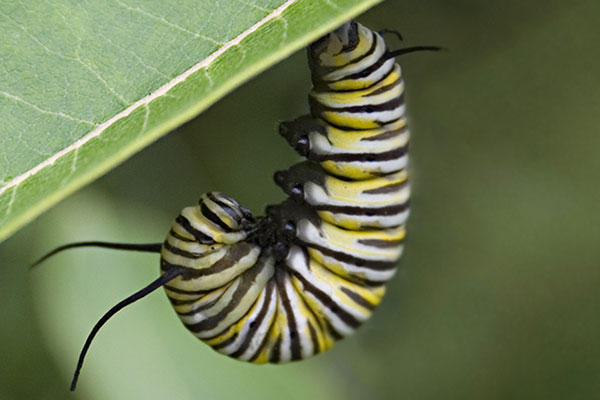Join thousands of citizen scientists on the 2018 International Monarch Monitoring Blitz to save the monarch butterfly
Montreal, 24 July 2018—From July 28 to August 5, 2018, citizens from Canada, Mexico and the United States are invited to join the second International Monarch Monitoring Blitz (the Blitz) to help identify the monarch butterfly's breeding sites that are essential to its survival.
The majestic monarch butterfly, a flagship North American pollinator and symbol of international cooperation, is on its spectacular annual migration from Canada and the United States to Mexico and it needs your help.
Scientists from across North America still have much to learn about monarchs and milkweed plants, the only food source for monarch caterpillars. Both the eastern and western populations of North American migratory monarchs have suffered steep declines over the past 20 years. Observations from citizens can help scientists gain valuable information that will support continental efforts to protect the monarch butterfly and its habitat.
What is the International Monarch Monitoring Blitz?
The International Monarch Monitoring Blitz aims to provide a valuable snapshot for scientists of monarch population status across the monarch migration paths in Canada, Mexico, and the United States. The Blitz is an initiative from the Trinational Monarch Conservation Partnership, created through the Commission for Environmental Cooperation. Through the Blitz, scientists from the Insectarium/Montréal Space for Life, Environment and Climate Change Canada (ECCC), Monarch Joint Venture, the US Fish and Wildlife Service, and Mexico's Comisión Nacional de Áreas Naturales Protegidas (Conanp) are asking the public to help them understand monarch distribution and occurrence throughout North America.
Each country has something to learn from monitoring monarchs during the same time period, and comparing these observations year-to-year. Observations reported in Canada and the northern United States will provide scientists with a snapshot of the peak breeding monarch population and the presence of milkweed. Reports from the southern United States will document whether early migration and breeding are occurring. Data collected in Mexico will document any monarch breeding taking place in traditionally migratory areas.
Canadian citizens interested in taking part in the Blitz can visit the Mission Monarch website, US citizens are invited to visit the Monarch Larva Monitoring Project page, and Mexican citizens can learn more on the iNaturalista website.
Follow the Monarch Blitz on social media by using the hashtag #MissionMonarch!

Between July 28 and August 5, 486 citizen scientists from Canada, Mexico and the United States recorded 13,796 monarchs at various stages of their life cycle, from eggs to full-fledged butterflies, and monitored 53,588 milkweed plants while looking for monarch eggs and caterpillars
About the CEC
The Commission for Environmental Cooperation (CEC) was established in 1994 by the governments of Canada, Mexico and the United States through the North American Agreement on Environmental Cooperation, a parallel environmental agreement to NAFTA. As of 2020, the CEC is recognized and maintained by the Environmental Cooperation Agreement, in parallel with the new Free Trade Agreement of North America. The CEC brings together a wide range of stakeholders, including the general public, Indigenous people, youth, nongovernmental organizations, academia, and the business sector, to seek solutions to protect North America’s shared environment while supporting sustainable development for the benefit of present and future generations
The CEC is governed and funded equally by the Government of Canada through Environment and Climate Change Canada, the Government of the United States of Mexico through the Secretaría de Medio Ambiente y Recursos Naturales, and the Government of the United States of America through the Environmental Protection Agency.